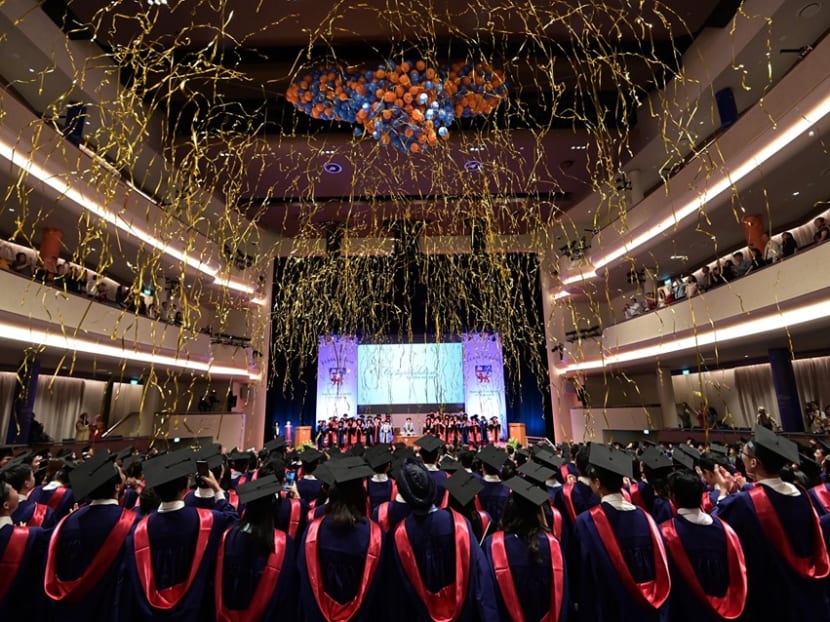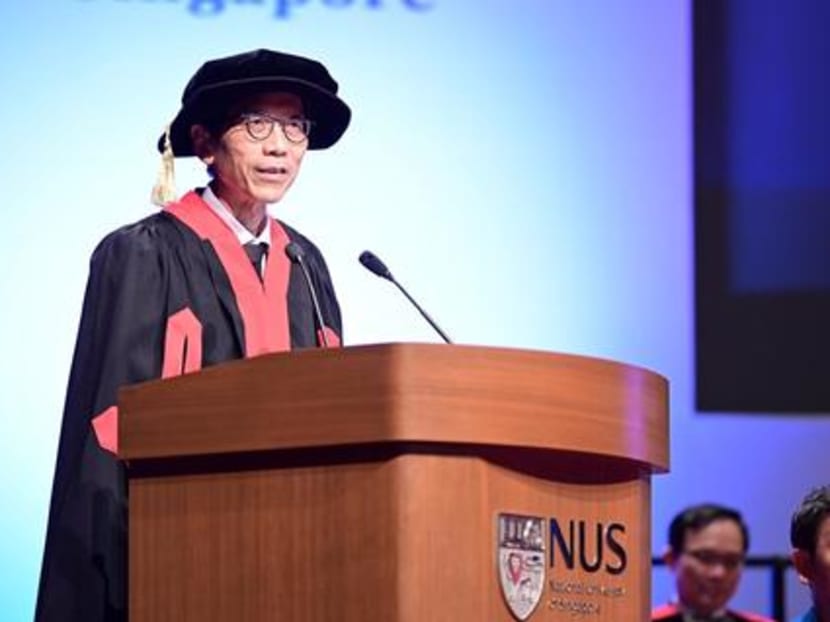A message for Singapore doctors on skills, trust and two delicious meals of lamb
The erosion of trust around the world today is worrying for the medical profession because it is built on trust, said Singapore’s Chief Health Scientist Tan Chorh Chuan, as he outlined three issues new doctors in Singapore face in a speech to fresh medical graduates.

Fresh medical graduates at the NUS Yong Loo Lin School of Medicine Commencement Ceremony on July 14, 2019.
The erosion of trust around the world today is worrying for the medical profession because it is built on trust, said Singapore’s Chief Health Scientist Tan Chorh Chuan, as he outlined three issues new doctors in Singapore face.
Professor Tan, who is also the Executive Director of the Ministry of Health’s Office for Healthcare Transformation, was speaking to fresh graduates of the NUS Yong Loo Lin School of Medicine on Sunday (July 14). Below is an excerpt of his commencement speech, where he also spoke about lessons from two special meals of lamb he had.
The journey of the effective physician is a lifelong one and for many of us, the most challenging phase is right at the beginning, in medical school. So we are all very proud of you - of your commitment to serve, your willingness to learn, and your achievements as students, as individuals and as contributing members to the broader community.
I hope you will always remember, as I do, what a privilege it is to be part of a healing profession.
In 1996, my wife and I were doing a trek in a remote part of Tajikistan. It was a place of immense beauty.
One day, we met some shepherds, one of whom had a really bad finger infection. There was a large collection of pus and the infection was spreading up his hand, so among the three doctors in the trekking group, we gave him a large dose of oral tramadol, incised and drained the pus and gave him a course of Azithromycin (an antibiotic).
The shepherds were so grateful, they invited us for a feast. That night we walked to a beautiful site framed by a giant rock and surrounded by high peaks on all sides.
There, they slaughtered and spit-roasted a lamb and we shared a magical meal to recitations of the poetry of Omar Khayyam.
Two days later, we met the shepherds again and were happy that our patient’s finger was much better. As doctors, we offer assistance when we can, without expecting expressions of gratitude or thanks. But when you do receive them, on occasions such as this, it is a very satisfying experience that reaffirms the value of the work that we do.
Some years later, we were on trek in the far northwest of Mongolia when we came across a local with a large infected wound on the arm. We cleaned it and gave him a course of antibiotics. He was so pleased he killed a lamb and cooked it Mongolian style.
This involved making a fire with dried dung, and heating stones with it. The hot stones were then put into a large metal canister together with big chunks of meat. The canister was sealed and to create a pressure cooker effect, the man stood on the lid for 20 minutes while the meat cooked.
It was a very clever way of cooking in a barren landscape with no trees and very little water. In case you are wondering, the lamb was delicious!
The purpose of relating these stories is not to tell you about different ways of cooking lamb. Instead, it is to underscore the main point I would like to make.
The knowledge and skills that you spent five hard years to acquire, are truly a precious gift. They not only allow you to diagnose and heal, but to serve patients well, be a source of comfort, and to have a positive impact on communities, no matter where they are.
For you to remain effective, you must continually learn, expand your knowledge base and hone your skills as a physician. It will make the journey you take much more meaningful, and it would make a real difference for your patients and the wider community.
You enter medical practice at a time of great change and opportunity. I would like to highlight three areas briefly.

Prof Tan speaking to the medical graduates. Photo: NUS Yong Loo Lin School of Medicine/Facebook
The first is demographics. When I started as a doctor, slightly more than 5 per cent of our population was above 65 years old. In 2030, when you would have practised for a decade, nearly one in four Singaporeans will be above 65.
This rapid shift will have a profound impact on all aspects of our society, including health and healthcare.
I won’t go into these because as graduates from a top-rate institution like the Yong Loo Lin School of Medicine, you would be completely up-to-date on the issues.
I would emphasise though that it means we must all focus even more on prevention, whether it is to advise our patients to have their recommended vaccines, supporting programmes that help keep seniors well connected socially, or addressing risk factors of chronic disease and their progression.
A recent study from the Institute for Health Metrics and Evaluation looked at population aging using methods that capture both the longevity and health of populations.
It reported that 76 year-olds in Japan have the same level of age-related disease burden as the global average 65 year-olds. The opportunity for us is to help our patients and population keep young health-wise even as they age chronologically.
This brings me to the second area I would like to highlight which is holistic care.
The rapid advances in medical science and technology will make the practice of medicine more complex.
There is therefore a natural tendency towards greater and greater specialisation amongst doctors and health professionals.
On the other hand, as patients get older, they often develop multiple medical conditions. We also know that the health and well-being are not just affected by medical conditions but also by social, economic and environmental factors.
This means that doctors and the healthcare system must treat each patient as a whole person and address his or her problems holistically.
There is clearly a tension between this need and the trend towards greater medical specialisation. This is not an easy issue to address.
However, as young doctors starting your medical careers, my hope is that you would not overly focus on becoming narrow specialists but to keep yourself sufficiently grounded in broader based medical practice.
There is also a crucial and growing role for good family physicians and generalist doctors, and I hope you would consider these as compelling options for the future.
The third area I would like to touch on is trust.
We live in a time when trust in general is diminishing, and trust in experts is being eroded. It’s hard to understand, for example, why so many people in advanced countries believe that well established vaccines are harmful.
This is worrying because the doctor-patient relationship, the effectiveness of health providers and the healthcare system, and the partnership between the health professions and society at large — all these are ultimately grounded on a solid foundation of trust.
It is therefore critical that all of us in the health professions work on this together, to actively contribute to building trust with our patients and the wider community.
Finally, my wife who is an anaesthetist and avid traveller, told me I must talk about work-life balance. Work-life balance is very important.
All of you should work hard but you also have the capacity to be very good doctors and have a varied and interesting life.
So to our graduating Class of 2019, I hope you will enjoy yourself and find great meaning in your future endeavours. Congratulations once again, and I wish you all the very best for the future.






